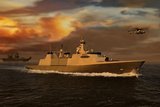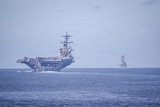Autonomous capabilities open doors for expeditionary fast transport to undertake new missions
The future USNS Apalachicola (EPF 13), pictured in 2021. (Photo: Austal)
On 29 July, the USN announced the thirteenth Spearhead-class Expeditionary Fast Transportvessel (EPF 13) was performing a series of planned test events to assess autonomous capabilities integrated into the ship to demonstrate a large ship can become a 'self-driving platform'.
Dubbed the 'Unmanned Logistics Prototype trials', the USN said each test event would increase 'the perception capabilities and complexity of behaviours demonstrated by the autonomous systems.'
As of 29 July, test evolutions included point-to-point autonomous navigation, vessel handling and transfer of control of the vessel between crewed and uncrewed modes.
Shipbuilder Austal USA told Shephard that integrating autonomous capabilities
Already have an account? Log in
Want to keep reading this article?
More from Naval Warfare
-
![US Coast Guard Cutter Polar Star’s 50-year service highlights capability gaps in Antarctica]()
US Coast Guard Cutter Polar Star’s 50-year service highlights capability gaps in Antarctica
Delays in the construction of the Polar Security Cutter – the future substitute for the Polar Star – are likely to prolong the ageing icebreaker’s service time even more, putting the USCG in a risky position.
-
![As Indonesia doubles up its order, who else is looking at the Arrowhead 140 frigate design?]()
As Indonesia doubles up its order, who else is looking at the Arrowhead 140 frigate design?
The adaptable design of Babcock’s Arrowhead 140 frigate, already selected by the UK Royal Navy and Poland, has led to more orders from Indonesia while other countries continue to weigh it up.
-
![Does the increase in US firepower in the Middle East indicate another Iran strike?]()
Does the increase in US firepower in the Middle East indicate another Iran strike?
The presence of the USS Abraham Lincoln Carrier Strike Group in the Persian Gulf means additional naval and aerial capabilities, which provides the US with multiple attacking options.





















